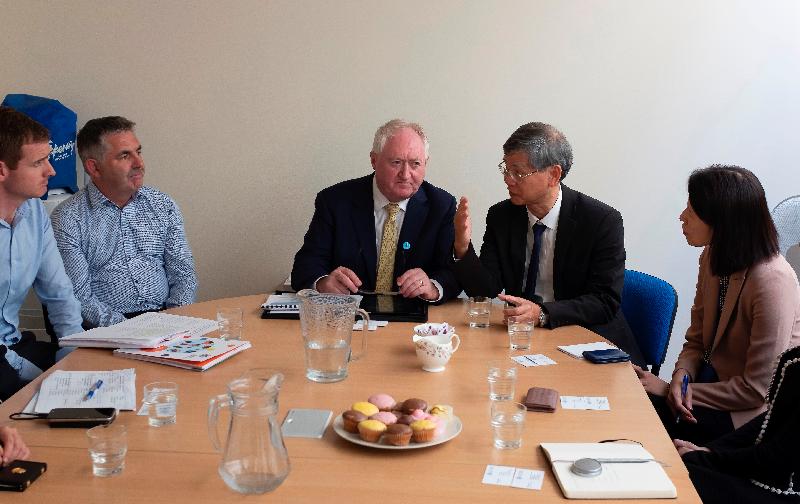Special traffic arrangements for race meeting in Happy Valley
Special traffic arrangements will be implemented in Happy Valley today (July 4). The arrangements will come into effect one and a half hours before the start of the first race and will last until the crowds have dispersed after the race meeting.
A. Traffic arrangements before the commencement of the first race
1. Road closure
Southbound Wong Nai Chung Road between Queen’s Road East and the up-ramp outside Hong Kong Jockey Club (HKJC) will be closed except for vehicles heading for Aberdeen Tunnel.
2. Traffic diversions
– Southbound Wong Nai Chung Road between Village Road and the up-ramp outside HKJC will be re-routed one way northbound;
– Vehicles from eastbound Queen’s Road East heading for Wan Chai and Happy Valley will be diverted to turn left to Morrison Hill Road;
– Traffic along southbound Morrison Hill Road heading for Happy Valley will be diverted via Sports Road and Wong Nai Chung Road;
– Traffic along Queen’s Road East cannot turn right to Wong Nai Chung Road except for vehicles heading to Aberdeen Tunnel;
– Traffic from Cross Harbour Tunnel heading for Queen’s Road East will be diverted via the down-ramp leading from southbound Canal Road flyover to Morrison Hill Road to turn right at the junction of Wong Nai Chung Road and Queen’s Road East; and
– Traffic from Cross Harbour Tunnel heading for Happy Valley or Racecourse will be diverted via the down-ramp leading from southbound Canal Road flyover to Canal Road East, southbound Morrison Hill Road, Sports Road and Wong Nai Chung Road.
B. Traffic arrangements during the race meeting
1. Road closure
The following roads will be closed from 35 minutes before the start of the last race:
– The up-ramp on Wong Nai Chung Road outside HKJC leading to Aberdeen Tunnel;
– Southbound Wong Nai Chung Road between Queen’s Road East and the up-ramp leading to Aberdeen Tunnel;
– Southbound Wong Nai Chung Road between Village Road and the Public Stands of HKJC;
– Westbound Leighton Road between Wong Nai Chung Road and Canal Road East; and
– Southbound Morrison Hill Road between Leighton Road and Queen’s Road East.
In addition, southbound Wong Nai Chung Road between the up-ramp leading to Aberdeen Tunnel and the Public Stands of HKJC will be closed from about 10 minutes before the start of the last race.
2. Traffic diversions
The following traffic arrangements will be implemented from 35 minutes before the start of the last race:
– Eastbound Queen’s Road East at its junction with Morrison Hill Road will be reduced to one-lane traffic heading for northbound Canal Road flyover;
– Vehicles from Cross Harbour Tunnel heading for Wan Chai will be diverted via the down-ramp leading from Canal Road East, U-turn slip road beneath Canal Road flyover, Canal Road West and Hennessy Road;
– Vehicles from Cross Harbour Tunnel heading for Happy Valley will be diverted via the down-ramp leading from Canal Road East, eastbound Leighton Road and Wong Nai Chung Road;
– Traffic on southbound Morrison Hill Road will be diverted to turn left to eastbound Leighton Road;
– Traffic along southbound Morrison Hill Road heading for Happy Valley will be diverted via eastbound Leighton Road and Wong Nai Chung Road; and
– Traffic along westbound Leighton Road will be diverted to Wong Nai Chung Road.
C. Learner drivers prohibition
Learner drivers will be prohibited to turn left from Caroline Hill Road to Leighton Road between one and a half hours before the start of the first race and one hour after the last race. In addition, learner drivers will be prohibited from accessing the following roads within the above period of time:
– Shan Kwong Road between Yik Yam Street and Wong Nai Chung Road;
– Village Road between its upper and lower junctions with Shan Kwong Road;
– Percival Street between Hennessy Road and Leighton Road;
– Canal Road East; and
– The service road leading from Gloucester Road to Canal Road flyover.
D. Suspension of parking spaces
Parking spaces on southbound Wong Nai Chung Road between Sports Road and Blue Pool Road will be suspended from 11am to 7pm during day racing, from 4.30pm to 11.59pm during evening racing, and from 5pm to 11.59pm during night racing.
Any vehicles found illegally parked within the precincts of the above affected areas will be towed away without prior notice.
Actual implementation of road closure and traffic diversion will be made by the Police at the time depending on traffic conditions in the areas. Motorists should exercise tolerance and patience, and follow the instructions of Police on site. read more




